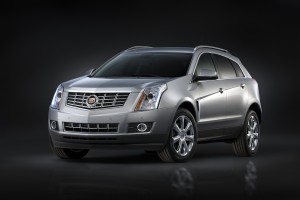General Motors is adding another 524,000 vehicles to its seemingly never-ending tally of recalled cars and trucks. The latest actions put the maker just shy of 30 million vehicles since the beginning of the year.
The automaker on Monday recalled 120,000 2010-15 Cadillac SRX SUVs in China and Canada for suspension issues, but declined to release the number of vehicles in the U.S. affected by the problem.
Today, GM said it would include 290,107 2010-15 Cadillac SRX and 2011-12 Saab 9-4X SUVs in the U.S. with the problem.
The issue stems from rear toe link adjuster bolts aren’t properly tightened. GM said the nuts holding the bolts in place may loosen and could result in a loose joint and worn threads that could cause the toe adjuster link to separate.
When owners take their vehicles to the dealer, they will inspect for the condition and, if necessary, will remove them and install a new link assembly. Unsold vehicles are being checked for the problem.
(GM employing less is more philosophy. For more, Click Here.)
The problem has been the cause of three crashes and two injuries.
(Click Here for details Mercedes new AMG GT.)
Additionally, GM is recalling almost 90,000 2013-15 Chevrolet Sparks in the U.S. because rust can cause the secondary hood latch striker to stick in the open position. If the latch doesn’t close properly, the hood could open unexpectedly.
(To see more of the news from the Paris Motor Show, Click Here.)
Compounding the problem is the fact that the secondary hood latch that may prematurely rust at the latch pivot, causing the striker to get stuck out of position and preventing the striker from properly engaging the hood latch.
The maker said it will not sell any of the new Sparks – totaling about 13,000 vehicles – until it can repair the vehicles, However, the parts are not currently available.


These chronic recalls will not even be news in 12 months as it will just be part of business from now on in the auto industry for several reasons including the complexity of modern autos. You can’t eliminate all defects or potential safety issues so auto makers and their vendor suppliers should be held accountable when they ship defective designs or components.
Unfortunately NHTSA hasn’t done a very good job in the past and it has created a huge void for safety issues to disappear too. We still have major safety issues with BMW X35i model high pressure fuel pump failures that was even featured on the U.S. national news that have never been properly repaired. BMW agreed to extend the warranty with complete disregard for the safety of people driving or riding in those vehicles when they shut-off without any warning even at highway speeds.
AFAIK there are still pending individual lawsuits against BMW yet to be settled. Why NHTSA would allow these BMW models covering 5+ years to NOT be properly repaired yet they would sue GM for an ignition switch issue that produces a similar result, is unknown even when accidents have been reported to NHTSA on these X35i model BMWs.
Do more people need to DIE before NHTSA forces BMW to properly repair these vehicles?